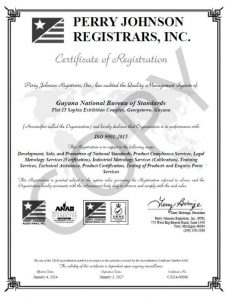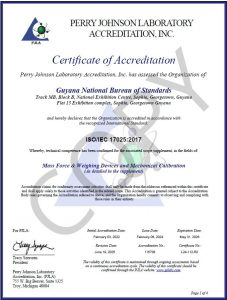The Guyana National Bureau of Standards (GNBS) has developed a Guyana Standard – Guidelines for noise emission into the environment (GYS 263:2010). This National Standard is very useful for those who cause noise or are affected by noise and need guidelines to manage or determine emission levels.
This noise standard provides guidance to the Environmental Protection Agency (EPA) which is responsible for regulating noise in Guyana. The Environmental Protection (Noise Management) Regulation 2000 requires permissible limits to be set for noise emanating from commercial, residential, institutional, educational, industrial, construction, transportation and recreational activities.
The standard specifies permissible/allowable noise levels for the aforementioned categories of operations in Guyana and offers definitions for each of them. For example, it defines industrial as any activity pertaining to manufacture, processing, handling, transport, importation, storage, or disposal of materials (including the extraction and conversion of mineral resources, raw materials, minerals in the process of manufacture, manufactured materials, by-products, etc.). In addition, it defines noise as unwanted sound, which may cause or tend to cause an adverse psychological effect on human beings and includes vibration.
Guideline values are specified in the standard for noise in each of the defined environments for which those operating within shall comply. Limits are specified for daytime and night-time in decibels (Db), with night–time limits always being lower than daytime. For residential, daytime limits are 75 decibels and night-time is 60 decibels. Meanwhile, industrial limits are set at 100 decibels during the day and 80 in the night.
Methods of taking samples for noise in the environment are stipulated in the standard. For the determination of noise levels specified in the standard, measurements shall be taken by noise receptors located at the property boundary and 15 metres from the source. All authorities including the EPA, the Ministry of Health, the Ministry of Labour and the Ministry of Home Affairs shall employ the sampling method.
According to one study, worldwide, noise-induced hearing impairment is the most prevalent irreversible occupational hazard. In developing countries, not only occupational noise but also environmental noise is an increasing risk factor for hearing impairment.
Given both the increasing number of noisy activities and the increasing exposure duration, such as loud music in cars, open-air parties and entertainment bars, regulatory activities should be undertaken.
Finally, another study of the effects of noise found that it is known to cause problems with concentration, fatigue, uncertainty and lack of self-confidence, irritation, misunderstandings, decreased working capacity, problems in human relations, and several stress reactions.
The GNBS encourages all categories of operations that emit noise to conform to the guidelines stipulated in the noise standard. This will reduce its adversity on others and ensure adherence to the law.
For further information, please contact the GNBS on Tel: 219- 0066 or visit our website: www.gnbsgy.org or like us on Facebook: gnbsgy






